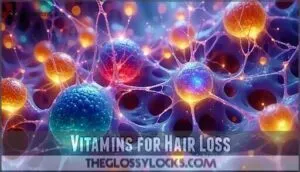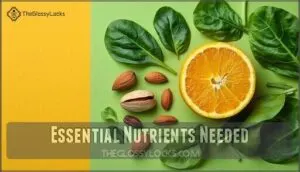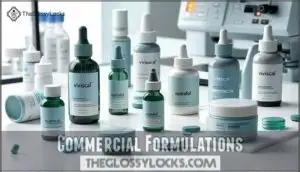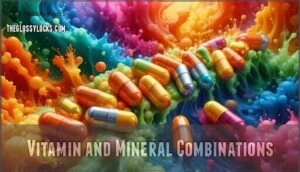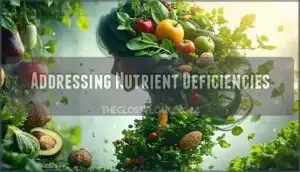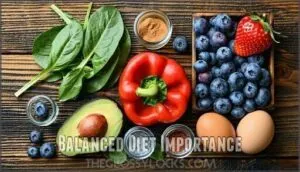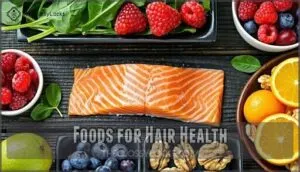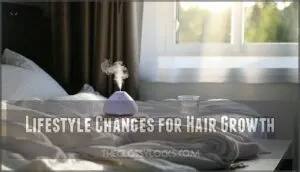This site is supported by our readers. We may earn a commission, at no cost to you, if you purchase through links.
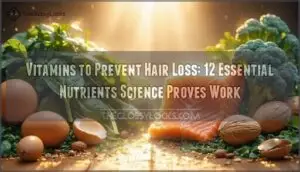
Biotin (vitamin B7) supports keratin production, essential for strong hair. Vitamin D, often called the "sunshine vitamin", helps stimulate hair follicles, while vitamin C boosts collagen production to strengthen your tresses.
Iron and zinc play key roles too—iron delivers oxygen to hair roots, and zinc bolsters follicle health. Don’t overlook omega-3 fatty acids or selenium for nourishment and shine.
A balanced diet rich in these nutrients can work wonders. Curious about which foods or supplements pack the most punch? There’s more to uncover ahead!
Table Of Contents
- Key Takeaways
- Vitamins for Hair Loss
- Essential Nutrients Needed
- Choosing Right Supplements
- Addressing Nutrient Deficiencies
- Preventing Hair Loss Naturally
- Frequently Asked Questions (FAQs)
- What vitamins are best to stop hair loss?
- What vitamins are you lacking if you have hair loss?
- What is my body lacking if my hair is falling out?
- Does vitamin D stop hair falling out?
- Can stress cause nutrient deficiencies affecting hair?
- How does gut health influence hair growth?
- Are there age-specific vitamin needs for hair?
- What are uncommon signs of vitamin deficiencies?
- Do environmental factors impact vitamin absorption for hair?
- Conclusion
Key Takeaways
- Focus on essential vitamins like biotin, D, C, and E, which strengthen hair, boost growth, and protect follicles from damage.
- Include minerals like iron and zinc in your diet to ensure oxygen delivery to follicles and support keratin production.
- Eat nutrient-rich foods such as eggs, spinach, and citrus fruits while hydrating to promote stronger, shinier hair.
- Manage stress, maintain good gut health, and avoid harmful habits like excessive sugar or alcohol for optimal hair wellness.
Vitamins for Hair Loss
You’ll find that specific vitamins play a vital role in maintaining healthy hair follicles and preventing hair loss when incorporated into your daily routine.
Research shows that vitamins A, B-complex, C, D, and E support hair growth by enhancing circulation to the scalp and strengthening hair structure at the cellular level.
Vitamin a Role
Maintaining the right balance of vitamin A is essential for preventing hair loss.
This powerful nutrient works behind the scenes to support your hair’s natural growth cycle.
- Promotes sebum production, keeping your scalp moisturized and preventing brittle strands
- Regulates blood circulation to hair follicles, delivering essential nutrients
- Supports immune function, preventing conditions like follicular hyperkeratosis
Too little causes deficiency symptoms including dull, dry hair, while excess leads to toxicity risks and ironically, hair loss itself, which can be prevented by maintaining the right balance of nutrients for healthy hair.
Vitamin D Benefits
Vitamin D stands as a powerful ally in your fight against hair loss.
Vitamin D is your secret weapon against hair loss, supporting follicle development and immune health for stronger, healthier strands.
Research shows that 81.8% of people experiencing hair loss have low vitamin D levels.
Whether you’re dealing with alopecia areata (51.94%), female pattern hair loss (50.38%), male androgenic alopecia (47.38%), or telogen effluvium (53.51%), vitamin D deficiency is consistently linked to your hair troubles.
This nutrient supports both follicle development and immune function—two critical factors for maintaining healthy hair growth.
Biotin Importance
The spotlight on biotin for hair loss treatment has grown dramatically in recent years, with good reason.
This B-vitamin, also known as vitamin B7, plays a vital role in your hair’s health and growth cycle.
Biotin benefits your hair in three key ways:
- Strengthens hair follicles to prevent breakage
- Improves keratin infrastructure in hair shafts
- Supports metabolic functions that promote healthy hair growth
Your daily biotin dosage needs are typically 30-100 micrograms, but biotin deficiency symptoms like thinning hair may require supplements.
Vitamin C Effects
Looking beyond its immune-boosting reputation, vitamin C plays a vital role in collagen synthesis, directly supporting your hair’s structure.
It enhances iron absorption, helping prevent deficiency-related hair loss.
As a potent antioxidant, vitamin C protects follicles from oxidative stress. Deficiency symptoms often include rough hair that breaks easily.
For ideal hair growth, aim for 75-90mg daily through citrus fruits or supplements if needed.
Vitamin E Functions
While vitamin C guards against free radical damage, vitamin E takes hair protection to another level.
As a powerful antioxidant, it improves scalp health and boosts circulation to hair follicles.
Studies show tocotrienol benefits include increased hair density in people with alopecia.
A weekly application can nourish hair deeply.
You’ll find vitamin E in nuts, seeds, and plant oils—or in supplement form.
However, research on vitamin E for hair growth remains limited compared to other hair loss vitamins.
Essential Nutrients Needed
Your hair’s health depends on more than just vitamins, with minerals and fatty acids playing essential roles in preventing hair loss and supporting growth.
You’ll need specific nutrients like iron, zinc, omega-3s, and selenium that work together to maintain follicle function and promote the strong, vibrant hair you’re hoping for.
Iron Deficiency Impact
While vitamins directly affect hair health, your body’s iron status might be the hidden culprit behind thinning locks.
Iron deficiency impacts hair follicles by limiting oxygen delivery through hemoglobin, potentially triggering shedding.
- Low ferritin levels are clinically linked to increased hair loss patterns
- Anemia symptoms often appear alongside thinning hair before diagnosis
- Iron absorption requires vitamin C to maximize effectiveness
- Supplement side-effects can include constipation if not properly formulated
Zinc Benefits for Hair
Zinc’s powerful impact on hair health can’t be overstated.
Your body needs this essential mineral for proper cell division, protein synthesis, and hormonal balance—all vital for maintaining healthy hair follicles.
Zinc helps regulate DHT levels that can contribute to hair loss, while supporting oil gland function around hair follicles.
| Zinc Function | Impact on Hair | Deficiency Symptom |
|---|---|---|
| DHT Inhibition | Prevents follicle shrinkage | Excessive shedding |
| Protein Synthesis | Supports keratin production | Brittle, thin hair |
| Cell Division | Promotes follicle growth | Slow-growing hair |
| Oil Regulation | Maintains scalp health | Dry, flaky scalp |
| Immune Support | Fights scalp infections | Recurring dandruff |
The key to understanding Zinc’s role is recognizing its impact on hair follicles, DHT levels, and overall scalp health, which are crucial for preventing hair loss and maintaining healthy hair.
Omega-3 Fatty Acids
While zinc strengthens hair at the follicular level, omega-3 fatty acids work differently by improving scalp circulation and reducing inflammation.
These powerful fatty acids, found in salmon, walnuts, and flaxseeds, may boost hair density and decrease shedding.
Studies show omega-3s can make your hair look shinier while fighting underlying causes of hair loss.
Omega-3s nourish follicles, reducing inflammation for scalp health.
Though research is ongoing about supplement efficacy, incorporating these nutrients through diet offers promising results for healthier hair growth.
Selenium Role in Hair
Though often overlooked, selenium plays a pivotal role in hair follicle health by protecting against oxidative stress.
A deficiency might lead to hair loss, while too much poses toxicity risks.
Food sources like Brazil nuts and eggs offer a safe balance, and supplements aren’t always necessary, as hair thrives when you nourish it wisely with essential vitamins and minerals.
Choosing Right Supplements
When choosing supplements to tackle hair loss, you’ve got to focus on evidence-based options that address your specific needs.
Not all supplements are created equal, so understanding their ingredients and how they work can save you time, money, and frustration, by helping you make informed decisions about which supplements to use for your specific needs.
Commercial Formulations
If you’re exploring hair loss supplements, commercial formulations like Viviscal and Nutrafol stand out.
Backed by clinical trials, Viviscal improves hair health with marine proteins, while Nutrafol’s ingredients target causes like DHT buildup.
These hair health vitamins offer promising results, but supplement regulation varies.
Consider supplements that can stimulate hair growth to guarantee safety and efficacy. Always review formulation studies or consult a professional before trying hair loss supplements.
Natural Supplements
If you’re seeking natural hair loss vitamins, herbal remedies like saw palmetto act as DHT blockers, promoting scalp health.
Ayurvedic options, such as fenugreek seeds, may improve hair growth.
Topical solutions with pumpkin seed oil and hair loss supplements like biotin for hair loss show promise.
Saw palmetto’s impact on DHT levels is notable.
These vitamins for hair growth support healthier, stronger strands without synthetic additives.
Vitamin and Mineral Combinations
Pairing vitamins and minerals can boost hair loss treatments.
For instance, vitamin C enhances iron absorption, improving deficiency correction.
Vitamin D and zinc showcase synergistic effects, supporting follicle health.
Omega-3s combined with vitamin E may enhance scalp circulation.
Nutrient deficiencies can contribute to hair loss.
Using the right combined dosage guarantees better absorption rates and treatment outcomes, making supplementation more effective for addressing hair loss concerns.
Addressing Nutrient Deficiencies
If your hair’s thinning, it might be your body’s way of telling you it’s missing key nutrients.
Identifying and addressing deficiencies through diet, supplements, or blood tests can help restore balance and support healthy hair growth.
Diet and Hair Growth
What you eat can substantially influence your hair’s health.
A nutrient-packed diet supports hair growth and reduces shedding. Focus on protein intake for strong strands, and boost hydration effects for a nourished scalp.
Gut health matters too; a happy gut absorbs hair loss vitamins efficiently. Watch for food sensitivities—they might hinder absorption of vitamins for hair growth.
Eat smart, shine brighter!
Supplements for Deficiencies
Hair loss supplements can fill gaps when nutrient deficiencies like low vitamin D or iron are diagnosed.
Always check for proven supplement efficacy and stick to dosage guidelines—more isn’t better.
Be cautious, as supplement interactions or lack of regulation concerns can pose risks.
Many individuals explore options for vitamin D supplementation to address deficiencies.
For reliable results, pair hair loss vitamins with a balanced diet to support hair growth effectively.
Blood Tests for Deficiencies
Finding nutrient deficiencies starts with simple laboratory tests.
These pinpoint vitamin and mineral shortfalls affecting hair health.
Testing frequency depends on symptoms, with common deficiency markers being iron, vitamin D, and B12 levels.
Aim for accurate results—biotin supplements can skew them!
Interpretation guides treatment, so consult a doctor.
Tests include:
- Complete Blood Picture (CBC)
- Ferritin levels
- Vitamin D test
- Thyroid panel
Preventing Hair Loss Naturally
You can support healthy hair growth naturally by focusing on proper nutrition and making a few lifestyle tweaks.
A balanced diet, nutrient-rich foods, and avoiding harmful habits are simple ways to give your hair the care it deserves, which is essential for healthy hair growth.
Balanced Diet Importance
A well-rounded diet lays the groundwork for healthy hair, ensuring dietary diversity and ideal nutrient absorption.
Focus on balanced meals packed with proteins, vitamins, and minerals to support your hair’s strength. Hydration effects matter too—drink plenty of water!
Remember, gut health plays a key role in meeting nutritional needs.
| Key Element | Role in Hair Health | Examples |
|---|---|---|
| Protein intake | Strengthens hair strands | Eggs, fish, lean meats |
| Vitamins | Supports growth & repair | B, C, D-rich foods |
| Minerals | Prevents hair breakage | Zinc, iron, selenium |
| Gut health | Aids nutrient absorption | Yogurt, fiber-rich foods |
| Hydration effects | Improves scalp moisture | Water, herbal teas |
Foods for Hair Health
Eating foods packed with protein, like eggs and lean meats, strengthens hair from the inside out.
Iron-rich options such as spinach and legumes help carry oxygen to hair follicles, boosting growth. Add healthy fats from salmon or walnuts for glossy locks.
Don’t forget collagen boosters like citrus fruits and antioxidant-rich berries to enhance hair health while keeping your diet deliciously balanced.
Avoiding Harmful Substances
Avoiding harmful substances can protect your hair from unnecessary damage. Too much sugar, processed foods, or alcohol might worsen hair loss by increasing DHT levels or causing toxin buildup.
Watch out for excessive vitamin intake, like hypervitaminosis D, which has toxic side effects. Lifestyle choices, including stress management techniques, also play a significant role in hair health.
Stick to these tips:
- Skip sugary drinks.
- Limit processed food snacks.
- Avoid alcohol overindulgence.
- Monitor supplement doses.
- Reduce toxin exposure to minimize damage, and remember that lifestyle choices are crucial for overall well-being.
Lifestyle Changes for Hair Growth
Improving your lifestyle can boost hair growth and health.
Reduce stress with meditation or yoga; it helps prevent hair loss. Regular scalp massages increase blood flow to follicles.
Prioritize sleep quality—your hair loves rest. Stay hydrated and eat a balanced diet rich in hair loss vitamins.
Add exercise to improve circulation, supporting hair health from the inside out, and remember to stay hydrated.
Frequently Asked Questions (FAQs)
What vitamins are best to stop hair loss?
Imagine armor for your hair—vitamins like biotin, D, E, C, and A strengthen your strands.
They aid growth, combat damage, and nourish follicles, helping you fight hair loss like a warrior protecting their shield.
What vitamins are you lacking if you have hair loss?
If you’re losing hair, you might lack key vitamins like D, B7 (biotin), and C, plus minerals like iron or zinc.
Deficiencies in these can disrupt follicle health, but supplements work best when truly needed.
What is my body lacking if my hair is falling out?
Your hair loss could mean you’re low on vitamins like D, iron, or biotin.
Stress, hormonal shifts, or nutrient gaps might also play a role.
Check with your doctor for simple tests and next steps!
Does vitamin D stop hair falling out?
Vitamin D supports hair follicle health and growth by stimulating follicles, but it’s not a magic fix.
If you’re deficient, supplements might help.
Always check with your doctor before jumping into supplements or treatments.
Can stress cause nutrient deficiencies affecting hair?
Stress can lead to nutrient deficiencies by disrupting digestion and absorption or depleting reserves of key vitamins like B-complex, D, and iron.
This imbalance affects hair health, triggering thinning or shedding if left unchecked.
How does gut health influence hair growth?
Your gut health directly affects your hair growth by influencing nutrient absorption.
A happy gut guarantees you absorb essential vitamins and minerals, fueling healthy hair.
Think of it as your hair’s root support system!
Are there age-specific vitamin needs for hair?
Your vitamin needs for hair can shift with age.
For example, kids need biotin for growth, while adults may prioritize vitamin D for follicles.
Older adults often need extra vitamin B12 and iron to combat deficiencies.
What are uncommon signs of vitamin deficiencies?
Around 30% of people miss signs like brittle nails, mouth ulcers, or a swollen tongue as vitamin deficiency indicators.
Pay attention to strange cravings, pale skin, or constant fatigue—they might hint at hidden deficiencies.
Do environmental factors impact vitamin absorption for hair?
Your surroundings absolutely matter!
Pollution, UV rays, and excessive heat can deplete nutrients like vitamin D and antioxidants, impacting hair health.
Stay proactive—eat well, protect your scalp, and manage environmental stressors for thriving hair.
Conclusion
Think of your hair as a flourishing garden—it needs the right nutrients to thrive.
By embracing vitamins like biotin, vitamin C, and the "sunshine vitamin," along with essential nutrients such as iron, zinc, and omega-3 fatty acids, you can nourish your strands from within.
A balanced diet or targeted supplements can address deficiencies effectively, and science proves these vitamins to prevent hair loss truly work.
Take small, consistent steps, and your hair will reflect the care you invest.

